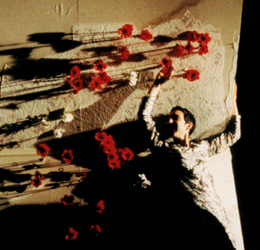|
Flowers on stage: from poppies to kudzu On the Ashden Directory, we have considered the various ways that mammals have been presented and interpreted on stage (from whales to wolves). This summer, we wanted to consider the dramatic impact of flowers. On ashdenizen, the Ashden Directory blog, we have posted a series of blogs: flowers on stage.
We invited contributions from a playwright, a performer, a designer and two academics, who have each chosen one play and one flower. Here are excerpts.

Under Glass, photo: Al Cane
|
The poppy
Frances Babbage writes about poppies in theatre company Bouge-de-là's production Under Glass.
Then utterly without warning, flowers push their way through the wall. The dirty, fading wallpaper becomes an Alpine meadow, and pressed against it she appears to us to lie amongst poppies: maybe sleeping; maybe dying ... Living flowers, poppies, pushing in through peeling paper, connect two worlds: poetically, the image layers fresh against stale; movement against stasis; death against life.
The lotus
Lotus Beauty is the working title of the play Satinder Chohan is currently writing about the lives of Asian women in Britain. I asked my mother about the lotus in rural India. As a child, she used to pop lotus seeds with her friends, eating them like popcorn. Lotuses used to spring up in flooded fields in her village. As frequent drought and new development swallowed up ponds and swamps, few remain ... I imagined how people gorge on money, not lotuses, that have risen from the murky swamps of Britain, leading to apathetic lives, disconnected from nature and one's environment.
The 'Breath of Life'
Stephen Bottoms writes about the queerness of flowers, and the 'Breath of Life', the experimental bloom cultivated by the proto-feminist heroine of Susan Glaspell's play The Verge.
This paradoxical bloom, though bred by a human, somehow radiates a strangeness that is beyond the frames of reference within which humans categorise and control the products of the natural world ... We domesticate flowers at our own risk. They’re deviant little buggers – as queer as they are natural, as artificial as they are real. And we made them that way.
The daffodil
Sue Palmer takes three views of flowers. First, as a member of the audience, she watches a performance of daffodils in Mary Southcott's Let's get some weather in here.
Just off centre in the performance space is a window box, a white plastic window box, and facing the audience are a row of daffodils, yellow and bright in the studio lighting. At one point in the performance, Mary switches on a desk fan that stands behind the daffodils and a deeply satisfying event takes place ... the daffodil heads respond - bobbing, nodding. Our attention is absorbed by the responsive movement of the flowers that is so familiar, so recognisable.
The lungwort
Sue writes about her own performance of a 'special guided tour' of the Dining Room at John Ruskin's House, Brantwood, using the elements of salt, money and flowers.
I scattered flowers around the edge of the dining table. Their perfume filled the room: roses, marigolds, camomile. Pinks, reds and yellows ... Charles Darwin had dined there in 1879. The discussion was probably rich, with Darwin speaking about the recurring struggle for existence, the mechanical process that had little or no reliance upon soul or will. And Ruskin passionate about his beliefs that nature did not exist by competition alone, that co-operation and ‘soul’ played crucial parts.
The snake's head fritillary
As a teacher of site-specific performance at Dartington College of Arts, Sue writes about the spring gardens at Dartington.
The astonishing emergence from bare earth to flush of leaves and flowers and then to seed follows the trajectory of the creative process – researching, devising and performing ... But the fecund Devon spring landscape is so complete in itself that to add ‘theatre’ to it often renders the maker superfluous to the ‘event’ of sheer abundance taking place all around: how can anything be added to a bluebell wood?
The kudzu
Ian Garrett writes about his experience as a designer with the kudzu plant.
The play called for a large facade in a tropical location. I wanted to ‘grow’ the set, researching into kudzu, an Asian vine. I wanted it for its quick growing properties, but soon learned that it was illegal to bring into Texas. It is a plant that could tough out the harsh theatrical environment, but also so aggressive that it is legislated against ... We should be thinking about our theatre spaces in the same way that landscape architects think about working with an indigenous environment. We should be thinking about making sure a building allows life into it in the first place.
ashdenizen.blogspot.com
published in 2010
|
Read the whole blogs:
The poppy
in Bouge-de-là's Under Glass.
The lotus
in Lotus Beauty (working title)
The 'Breath of Life'
in Susan Glaspell's The Verge. The daffodil
in Mary Southcott's Let's get some weather in here The lungwort
in Sue Palmer's performance at John Ruskin's House, Brantwood The snake's head fritillary
in site-specific performances in the Dartington Hall gardens The kudzu
not allowed in the theatre
ashdenizen.blogspot.com See also Wallace Heim's guest blog: Flowers and the curve of the eye.
|